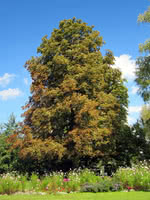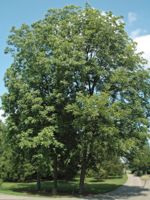Mon-Fri 9am - 5pm Mountain time
Horse Chestnut vs Hardy Pecan
Aesculus hippocastanum
Carya illinoinensis
CUSTOM GROW
NOT AVAILABLE THIS SEASON - MIGHT RETURN
Horse Chestnut is a medium sized deciduous tree that is native to Greece but has been grown in North America for hundreds of years. It produces large nuts.
Hardy Pecan trees are known for their edible nuts that ripen in late autumn. They can be eaten raw or cooked and can be used in a wide range of baked goods. If stored properly in a cool, dry location, they can be kept for up to 6 months in their shell. Trees tend to bear nuts at maturity, which occurs around 6 -10 years. The size and form of this tree also makes it a great shade or feature tree for your landscape.
For nut production, it is recommended that at least 2-3 are planted so that cross pollination can occur. In colder areas it is likely that nut production will be limited, especially in locations with late frosts and shorter growing seasons.
If exposed to high winds, Hardy Pecan is known to lose branches, but these can be used as firewood, or to smoke foods with a hickory flavour. Finding seed or seedlings of this tree is rare in Canada.
Note: plant this tree once. It will not respond well to transplanting.
Horse Chestnut Quick Facts
Hardy Pecan Quick Facts
Toxicity: most parts of plant are toxic

